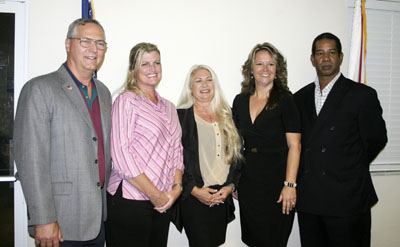The Indian Trail Improvement District Board of Supervisors on Wednesday approved Rosso Site Development’s low bid of almost $3.4 million for the long-planned Acreage Community Park expansion, subject to hiring subcontractors directly for the buildings in order to save money.
At their previous meeting, supervisors concerned about the cost had directed project engineer Gene Schriner to look for ways to save money on the project.
Schriner said he had met with Royal Palm Beach Village Manager Ray Liggins at ITID President Carol Jacobs’ recommendation to research cost-saving methods.
“We discussed this project and some other ways he bid jobs,” Schriner said. “They preclude contractors from issuing a bond if it’s under $200,000, and that saves roughly 3 to 4 percent.”
He gave the board some options.
“We have a conventional GC [general contractor] option, which we did. That’s the bid we put out. The GC runs the whole job. It’s a large project with 12 categories,” Schriner said. “What I mean by that, you have site preparation, site creating, sanitary sewer, potable water, drainage — and all require a different discipline, which may require different subs.”
He explained that each subcontractor has a markup with a general contractor.
“You’re paying for bonds, you’re paying for markups,” Schriner said. “Your other option is for you to be the GC.”
He compared the options to building a house where the homebuilder hires a contractor to do all the work or hires subcontractors separately to do portions of the work.
“The price will be a little higher than if you, as a homebuilder, actually sub out the plumbing and the roof trusses,” he said.
Schriner said he had separated the bid into 12 categories. Looking at them, he saw a way to save some money. “I’ve talked with some contractors,” he said. “On the buildings, I know right off the bat we can save $250,000.”
He said the only redesign from the original plan would be for bathrooms, which Jacobs had recommended a cost reduction by having the women’s and men’s facilities back-to-back rather than separate.
“If I look at all the other categories, I would say we could save 20 percent,” he said. “That’s based on markups from subs and efficiencies.”
Schriner added that he can work with ITID Engineer Jay Foy to see if there are portions of the project that the district can do itself, such as demolition.
“Jay and I have built plenty of projects of this magnitude,” he said. “Looking at 20 percent, you could have $850,000 in savings if we do that. It’s going to take more work from the district’s standpoint, because you’re going to be the manager of all these trades.”
Schriner added that they had received $1.2 million in grants for the project and had applied for more. “There’s no guarantee, but I think we could cut this to about $2.5 million if you act as the GC,” he said.
He also pointed out that there is less aggravation when using a general contractor, and more risk to the district without one because it has final responsibility, even if it hires a project manager to coordinate all the subcontractors. The bids would also have to go out again separately.
Schriner added that the Rosso bid, in his opinion, was a fair amount, but the district had the option of awarding the building contract separately at a savings of 20 percent, which amounts to about $200,000 to $250,000, with no objections from the contractor.
“We’re ready to go,” he said. “We’re close now. We’ve been doing this for 11 years, we’re close.”
Supervisor Gary Dunkley, however, who has favored a focus on drainage improvements over park projects, was generally opposed.
“We can’t have both,” he said. “There’s $3 million that already went into this park. No matter how you look at it, we’re going to have to raise taxes, and I keep on asking, there’s a maintenance cost for this park.”
Supervisor Michelle Damone said she favored going with the general contractor, with considerations to having a separate bid for the buildings, adding that the grants and other cost-saving measures would bring the cost to the district at much less than the Rosso bid.
“At the end of the day, we’ve gotten this far along, and we’ve been on this board to make all these decisions,” she said. “I don’t want to turn back. I want to move forward. This is what I will support. We’ve spent the money; we got the grants. Now we’re suggesting not to do it?”
Jacobs agreed that the district needs drainage improvements, but also park projects.
“We need that park. We’ve needed it for 15 years,” she said. “Since I’ve been on the board for 10 years, it’s just sitting there.”
Damone made a motion to approve the existing bid but rebid the buildings separately, which carried 4-1 with Dunkley opposed.
ABOVE: The Indian Trail Improvement District Board of Supervisors.








